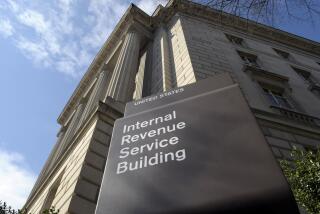Surplus in June Nearly Triples, Largely Due to Calendar Quirk
- Share via
WASHINGTON — The United States posted a larger-than-expected budget surplus in June as quarterly tax payments streamed into the Treasury and a calendar quirk shifted some government spending to a month earlier, according to government figures released Monday.
Last month’s surplus of $34.101 billion is almost triple the $12.814-billion surplus of the same month a year earlier, according to Treasury Department data.
The surplus puts the federal government on track to finish the fiscal year with a $116.750-billion deficit, the department estimated. That would be the smallest shortfall in more than a decade and even lower than the $117-billion deficit estimated by President Clinton’s economic advisors.
Federal government revenue and other income increased 2.7% in June from a year earlier to $151.919 billion. That’s a reflection of the “economy generating gains in taxable income for both corporations and households,” said Lynn Reaser, chief economist at Barnett Banks in Jacksonville, Fla.
More important for the June turnabout, though, was the 12.8% decline, to $117.818 billion, in federal spending in the month compared with a year earlier. In large part, that reflects a shift of Social Security and other entitlement payments that normally are made at the start of the month to May 31 because June 1 fell on a weekend. The timing quirk also explains why the May budget shortfall unexpectedly ballooned to $53.298 billion.
Before Monday’s report, a survey of analysts forecast a $25.8-billion surplus for June.
The Clinton administration’s estimate last week that the deficit would shrink to $117 billion in the fiscal year ending Sept. 30 would have equaled about 1.6% of the gross domestic product. That would be the smallest overall shortfall since a $79-billion deficit in fiscal 1981 and, in terms of percentage of GDP, the smallest since 1974 and by far the smallest among the Group of 7 industrialized nations.
For the first nine months of the fiscal year, the deficit totaled $75.022 billion, down 39.3% from $123.669 billion last year, reflecting a slower rate of spending growth and stronger tax revenue.
The Treasury usually reports deficits in most months, but moves into the black in January, April, June and September, when quarterly tax payments are made.
Though lower spending and fast-paced economic growth are helping hold down this year’s shortfall, “I think [the improvement] is going to be short-lived,” Reaser said.
“The economy is probably going to slow to a more moderate track, and the real question remains entitlement spending,” she said. “Congress still has to come to grips with Medicare, Medicaid and Social Security.”
Entitlement spending accounts for more than half of federal spending. Unless it is brought under control, economists warn, annual deficits could balloon to more than $300 billion by early in the 21st century.
More to Read
Get the L.A. Times Politics newsletter
Deeply reported insights into legislation, politics and policy from Sacramento, Washington and beyond. In your inbox twice per week.
You may occasionally receive promotional content from the Los Angeles Times.










